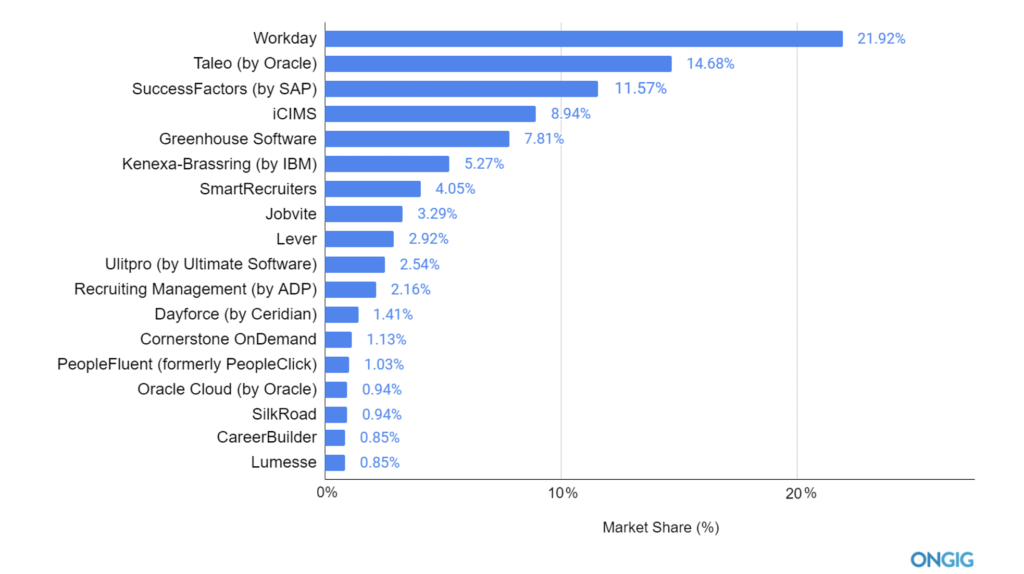Okay, you guys know I love my guy, Rob Kelly over at OnGig and his team, for putting together data around the most used ATSs. OnGig recently released their latest report and I wanted to share some highlights and reactions.
First, let’s answer the biggest question – is this real? Yes, Rob and the team looked at over 1,000 companies and dug into which specific ATS they are using. Most were Enterprise level, but there were also a number of SMBs.
Here’s the breakdown: (click on the pic for a larger version)
Tim’s Reactions:
– In 2018, Workday had a 4.20% share in the enterprise ATS market. In 2020, that has grown to 21.92%, and they have thousands of customers going through and waiting on implementation. Workday has taken over the recruiting market at the enterprise level as of right now and I don’t expect that to change anytime soon.
– In 2017 Taleo’s market share was 25.51%, in 2018, 19.11%, and in 2020, 14.68%. Still a giant piece of the market, but it shows how Taleo didn’t react quickly enough to the changing marketplace to keep or grow their huge advantage. Keep an eye on Oracle Recruiting Cloud and the impact that will have for those Oracle customers looking to move to the cloud and away from Taleo.
– iCIMS share at 8.94% is extremely impressive, given they totally retooled their software over the past year or so, and basically pioneered the recruiting “App Store” marketplace concept which allows users to build an integrated stack with the features they want fairly easily. Also, this number doesn’t include many of the mid-market, SMB customers iCIMS have.
– Along with iCIMS, Greenhouse, SmartRecuriters, and Jobvite are all top best of breed ATS plays on the market and we are beginning to see this separation of organizations who are choosing the Best of Breed recruiting technologies, to those who are using the Giant HCM recruiting modules (Workday, Oracle, SAP).
What does any of this mean to Enterprise TA Leaders?
If I’m a current TA Leader working for an F1000 organization I better be ready to answer this question:
“Why can’t you, or can you, use the recruiting module for our large HCM stack?”
Every single CFO, CIO, and CEO, if they haven’t already are going to be looking at their financial, operational, and supply chain stack and making a decision, most likely, between Workday, Oracle, and SAP (there are some others, but these 3 own 90%+ of the market).
These leaders are being sold on the power of one platform and the ability to leverage all of that data, and part of that decision will be HR and TA explaining the benefits and drawbacks of going enterprise module solution versus best of breed.
By the way, and this is very important, your input to this decision, as a TA and HR leader, will be weighted by the overall cost of the combined organizational solution and decision. Don’t be confused and think you are an equal player in this decision. The reality is, we (HR/TA) are not, as our portion of this contract is peanuts compared to the rest. The CFO and CIO are the big players, so if you want leverage around what you need, make friends fast!
Final Thoughts:
Many of you will not be given a decision on the TA tech stack you are given. I find that unfortunate, but that is a reality at the enterprise level. HCM Recruiting Module, best of breed ATS, an Excel spreadsheet, they all work, if we make them work.
Workday has a tremendous partner network with some of the most advanced recruiting technology on the planet. You can build a great Workday TA stack. You can build a very strong Oracle TA stack. The key is getting the decision-makers to understand, no matter what system you choose, the core ATS is only the foundational piece, and each of us will have other pieces that we’ll need to add to that stack to make it most effective for our organization.
Those pieces will cost money, on top of the money that is spent on the foundational ATS. Try not to allow yourself to be handcuffed with a new ATS (at any level) and be told this is all you get. Modern-day recruiting and talent attraction take way more than just an ATS.
One last shoutout to Rob and the OnGig team – keep up the great work!

